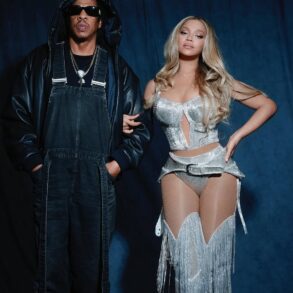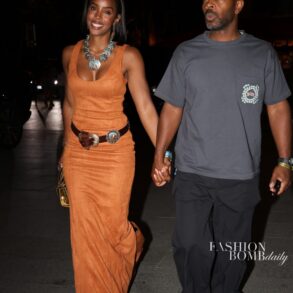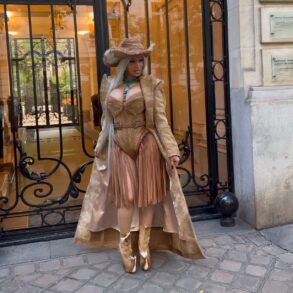The most anticipated collection of 2023 was finally unveiled to press last Friday during one-on-one appointments in a bright, airy London showroom, with clothes hung on racks and jewelry and accessories displayed on tables.
Phoebe Philo was not physically there, but her inimitable fashion handwriting was. The collection embodied her penchant for luxurious fabrics and impeccable make, unexpected flourishes via volume or texture, and womanly silhouettes with a modernist touch.
Some might categorize these largely unadorned, at times monastic clothes as quiet luxury. The colors didn’t move much beyond black, white, olive and oxblood, and prints were almost nonexistent. Yet they were far more interesting and hardly quiet, with each garment sheltering some sly, subversive surprise, or edgy detail.
Consider the bondage straps hugging the knees of tailored pants; the zippers running all the way up the back of each pant leg of roomy, five-pocket mom jeans, or the sleeves of oversize sweaters and tailored jackets ironed hard so they’ll keep their creases.
Not since fashion fans stormed the gates of Claude Montana’s Paris shows in the ’80s have meaty leather bombers and coats come with such dramatic batwing sleeves.
There was a perfume of early Martin Margiela to some of the bold and inventive tailoring and dressmaking.
Philo’s double-breasted suits, based on menswear, were handsome. The demonstrative shoulders were pitched forward, and the waists notched like an hourglass. Her short, lopsided scarf-like dress in soft, heavy satin sheltered a built-in bodysuit.
Looks were mainly dressy, roomy and polished, with a few outliers, including four-way stretch leggings with an ombre wave pattern on the outer thighs, and a red ski sweater streaked with bold graphics.
There were showstoppers, too, including leather tote bags big enough for a microwave; bodysuits, bondage belts and swimwear studded with gleaming, metallic orbs, and a series of coats, bias-cut dresses and satin trousers awash in dense, thread-like embroideries.
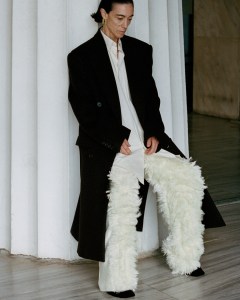
A look from Phoebe Philo’s first “edit,” the name she using to describe her seasonless collections.
Courtesy of Phoebe Philo
Philo’s first designs under her new signature brand, which she’s been incubating for more than three years, covered the gamut of categories, spanning ready-to-wear, footwear, handbags, jewelry and eyewear.
The jewelry was a standout, and included a chunky necklace with the repeating word “Mum” in 23-karat gold, a reference to motherhood (Philo has three children) — or perhaps to the quiet maturation of this collection.
A flexible gold cuff and rectangular ring had ancient Egyptian flair, while a pair of dangly earrings made from tiles had an Art Deco edge. Sunglasses, oversize, black and square-ish, were meant for maximum coverage.
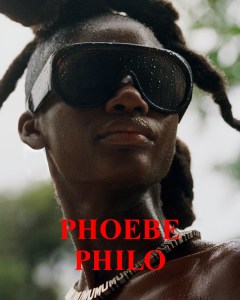
Sunglasses and jewelry are among the accessories in the first edit.
Courtesy of Phoebe Philo
The British designer considers this her debut “edit,” and the first of its three deliveries will be available for purchase from Monday exclusively on her website.
She plans to release future edits according to her own schedule, rather than the standardized fashion calendar. She sees her designs as seasonless and part of a continuous body of work.
The debut felt similar to Philo’s 2009 arrival at the helm of Celine in Paris, when she also hosted a showroom presentation.
At the time she unveiled a clutch of bags that would become iconic, and revealed an approach to fashion — minimal in orientation, but spiked with fashion thrills — that attracted a cult-like following among her female customers, and spawned a host of would-be Phoebes.
Once again, her carefully considered designs have a conceptual and intellectual bent, with campaign images designed to attract the female gaze. She recruited a diverse crew of women and a few men — some street-cast in Athens — for a series of arty images that will populate the new website and be dispatched to fashion media.
Canadian model Daria Werbowy, a Philo favorite, makes a comeback, too.

Daria Werbowy in the Phoebe Philo campaign.
Courtesy of Phoebe Philo
Yet there is plenty that’s new in the fashion house she’s building. She plans to make it as sustainable as possible, headlined by quantities calibrated to fall short of demand and eliminate overproduction — perhaps the biggest blight of the fashion industry.
“As part of our determination to address overall environmental impact, our focus is on the material issues of overconsumption, waste and the fashion supply chain. Our aim is to create a product that reflects permanence,” the fashion house said in a brief statement of bullet points.
“The Phoebe Philo business model is designed to create a responsible balance between production and demand. For us, this means producing notably less than anticipated want,” it added.
Anticipation has reached peak levels since Philo revealed in July 2021 that she would be returning to fashion with a new, independent house, and with LVMH Moët Hennessy Louis Vuitton as a minority investor.
Her Instagram account, which currently has no posts, boasts 287,000 followers, and it is understood that legions of potential customers have registered at phoebephilo.com to receive updates, the first of which was to reveal the Oct. 30 release of the first edit, dubbed A1.
It comprises 150 styles, with the first of three deliveries the most significant in size. The second edit, A2, will arrive in spring 2024.
Retail prices for A1 range from $1,400 to $2,400 for trousers; $2,200 to $8,500 for dresses; $3,600 to $4,800 for knits; $3,600 to $4,500 for tailored jackets; $6,900 to $12,000 for leather jackets, and $16,500 to $25,000 for shearling jackets. Shoes run from $1,100 to $1,750 and handbags from $3,500 to $8,500.
Most of the collection is manufactured in Italy. Initially, Philo’s online store will ship to addresses in the U.K., Europe and the U.S.
WWD broke the news in February 2020 that Philo had started planning a new collection and was interviewing designers.
No fan of interviews or proclamations and with a preference to let her products do the talking, Philo has said little since confirming her return to fashion in July 2021.
At the time, she vowed to create clothing and accessories “rooted in exceptional quality” and design.
“Being in my studio and making once again has been both exciting and incredibly fulfilling,” she added in that brief statement. “I am very much looking forward to being back in touch with my audience and people everywhere. To be independent, to govern and experiment on my own terms is hugely significant to me.”
One of the most revered — and bankable — designers of her generation, she is probably best known for engineering a brand rejuvenation at that LVMH-owned Celine. Season after season she minted covetable clothes and distinctive handbags, accruing an intensely loyal fan base.
A graduate of London’s Central Saint Martins, Philo was classmates with Stella McCartney and worked with her when McCartney launched her own collection after graduation. Philo followed McCartney to Chloé in 1997 and took the top job in 2001 when McCartney left to set up her own fashion house in a joint venture with Gucci Group.
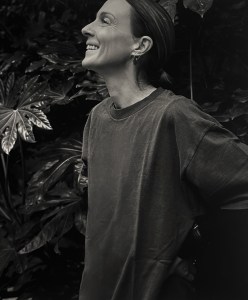
Phoebe Philo
Courtesy of Phoebe Philo
With her striking personal style, Philo succeeded in accelerating Chloé’s rejuvenation and catapulting it into the high-margin leather goods business.
She became known for fashions that deftly blended masculine elements like trousers with feminine fare such as frilly blouses. During her tenure, Chloé’s look was widely emulated by fast-fashion chains and she created hit handbags like the Paddington and Silverado.
She resigned from Chloé in 2006 for personal reasons, citing a wish to spend more time with her young children.
Three years later, after lengthy discussions with LVMH about launching a namesake brand, Philo landed the helm of Celine. The brand offered an immediate platform for her designs, boutiques in top locations around the world, and factories for leather goods.
There, Philo debuted a more fashion-forward, minimalist aesthetic, tinged with arty touches. Her collections exceeded all revenue expectations and won wide acclaim despite her reticence about e-commerce and an arm’s-length policy with the press.
The designer has kept a low profile since exiting Celine at the end of 2017, and seems to prefer things that way.
— With contributions from Samantha Conti
This post was originally published on this site be sure to check out more of their content.




